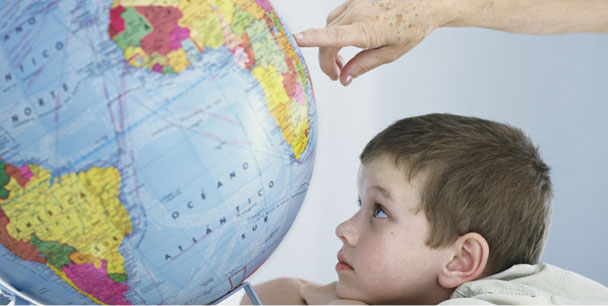
Today, however, those things which occupy us in the field of education are the interests of humanity at large and of civilization, and before such great forces we can recognize only one country—the entire world. -Maria Montessori, The Montessori Method
There are endless reasons to choose Montessori, as a teacher or as a parent. Maybe you are attracted to the high academic outcomes. Maybe you appreciate an individualized experience for children. Maybe the idea of multiage classrooms and the fluidity of learning appeals to you. Maybe you went to a Montessori school as a child and, while you can't remember what you loved about it, you remember that you did and you want the same for other children.
Think about all the strengths of this Method, the peaceful classrooms, the cooperative learning, the self-regulation and agency that's developed in learner, the confidence in risk-taking, the ability to self-correct and the academic advancement. It does seem that, when done healthfully, this is a model that resolves many of the internal debates in education reform. Should we have limits or freedom? Montessori says both. Should we be holistic or focus on academic growth? Montessori says both. Should we offer specific content or open-ended discovery?Montessori says both.
Surely this can't all be possible? What is it about this practice that makes the classroom function so differently? How can we manage groups of twenty-five or thirty or forty children at a time, each engaged in their own activity, each propelled by their own intrinsic motivation, and not have complete chaos? What is unique here that makes Montessori environments, healthfully prepared, match the needs of children all over the world without limiting them anywhere?
Simply, Montessori is not designed for American schools or British schools or Chinese schools or Romanian schools. Montessori is not designed to meet the demands of legislators or reformers. It's not designed to make parents happy or to build a better generation of workers. (It just happens to anyway.)
The Montessori Method serves the essence of the child, those qualities separate from the influences of educational fads or pendulums. Montessori works not because it is driven by the whims of policymakers, but because it is servant to the needs of the child.
And, as it turns out, when you prioritize the child, the rest falls into place, too. As it turns out, when adults put aside their own egos, when we worry less about who we want children to be and instead prepare environments that let them be who they are, we are rarely disappointed. It turns out that those core beliefs, that children are inherently good, that they are essentially peaceful and that they are intrinsically motivated to learn, hold true when we allow for them, regardless of cultural background, political climate or policy cycles.
Of course, knowing how to prepare the environment within which children's natural conditions are protected is key. Knowing how to observe children scientifically, how to design and introduce materials that are intellectually, socially and spiritually aligned to each child, how to analyze how children engage afterward and adjust our practice in response: it's challenging, rigorous and necessary work. What's critical about the prepared environment is that it is prepared for the specific, observed needs of the actual children it serves. It's not enough just to trust children to be good, peaceful, and motivated in spaces that are designed for adults or, worse yet, designed in ways that may (even unintentionally) undermine those qualities. Protecting the essential nature of children is not the same as anything-goes lenience. In achieving it, we find a similar resolution to seemingly opposing qualities. Should teachers be experts in their practice or humble to the child? Montessori says both. Should classrooms be scientific or wondrous? Montessori says both. Should adults design the curriculum or fade into the background? Montessori says both.
Montessori asks us to challenge ourselves to think beyond our own cultural priorities, beyond the pressures of policymakers and politicians, to commit to protect the essential nature of each child. When we do, we still get those academic outcomes we're hoping for. We still get the peaceful classrooms and the responsible, civic-minded learners. We still get innovative thinkers and leaders (who happen also to be reliably good workers.) But more importantly, we serve humanity at large. The nature of the child is not determined by the political borders of his birth. Nor should be our service as teachers, parents and Montessorians.
#ForParents #ForTeachers #Theory #General #June
